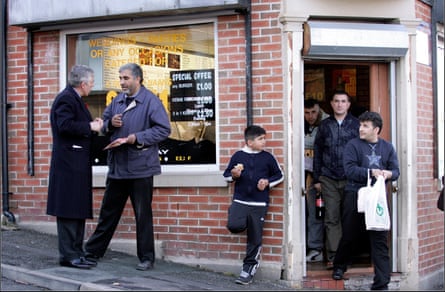Keir Starmer and his ministers must not “panic” about the threat of Nigel Farage, the former home secretary Jack Straw has said, adding that the prime minister had impressed on the world stage and should show more of that side of himself at home.
In an interview with the Guardian, he praised Starmer’s intention to recognise a Palestinian state after an ultimatum to Israel – but defended the home secretary, Yvette Cooper, saying he would also have proscribed the direct action group Palestine Action.
The British political veteran said he believed Starmer and his cabinet were “head and shoulders” above opposition politicians and would reap the rewards of a gradual improvement in the economy and public services, which would not come immediately.
And he said the poll lead of Reform UK should not be taken as a foregone conclusion. “We have been here before in terms of an insurgent party leading in the polls. So I think it is the famous phrase – don’t panic,” he said.
The former cabinet minister said Labour faced not only a terrible economic inheritance, but fundamental damage to the fabric of democracy by the previous Conservative governments, primarily Boris Johnson.
“Johnson polluted British politics and although he’s left the stage, that pollution carries on, and has been very profound,” he said. “People look at the first Blair period with kind of rose-tinted spectacles. It didn’t always feel that it was easy at the time, but the inheritance was much easier.”
Straw said there had at least been an appreciation in 1997 that his predecessors had been competent people. “These people [in the last Tory government] were not competent. They couldn’t do the job. In the space of four years, I think there were five home secretaries,” he said.
Straw, who was foreign secretary during the invasion of Iraq, which he later admitted had been a mistake, said he had spent time in the run-up to last year’s general election with David Lammy and dismissed the idea Labour that had not been adequately prepared to enter government. “The issues that they’re dealing with have become much more intense,” he said.
“I was talking to someone who worked for years in the Treasury, he was saying how these ministers are head and shoulders above what he described as the Fourth XI of the previous government.”
Straw represented his Blackburn constituency for 33 years, and has often talked about how he had been proud that a Labour government had helped to heal racial and social divisions in Britain, which many in Westminster now feel have fractured with tensions exploited by Farage and others.

His seat is now held by Adnan Hussain, a pro-Gaza independent. Straw, who until recently still chaired a youth centre in the town and still chairs a chain of academies including Muslim faith schools in Blackburn, said it was hardly surprising given the strength of feeling about Gaza.
He said he knew Hussain and thought he was “throughly decent” and added: “Politics there has always been complicated.”
But he said it was clear that politics was fracturing in a way that would start to produce unpredictable results – particularly under first past the post, which he favoured abolishing.
“The party needs to think about that,” he said of electoral reform. “And it would get through, I think people understand that in a multi-party situation, first past the post is potentially unfair. It can produce really quirky results. Farage could come through on that.”
Could he envisage Farage as PM? “There is a chance. I think it’s a small chance, smaller than he thinks. The Tory party appears to me to just be collapsing,” he said.
Although he admitted he did not expect such a plummet in popularity for Starmer and Labour, he urged the party to remain calm. “In 2000 of course we lost the mayoral election to Ken Livingstone; that was regarded as a great humiliation for Labour.
“So, not being Pollyanna-ish about this, but my instinct is that things will gradually improve.”
He said he hoped a sceptical UK public would begin to make the connection between Starmer’s successful diplomacy, especially with Donald Trump, and the kind of statesman he could be at home.
“The way Starmer has navigated the challenge from America has been extraordinary,” he said. “This government has made missteps, which all governments do, and not least about things like [welfare].
“But at some stage I think that people will start to make the connection between the stalwart international statesman and Starmer the domestic prime minister, and realise that we’re talking about the same person and the character.”

In one of his first acts as home secretary Straw was the architect of the Human Rights Act 1998, incorporating the European convention on human rights (ECHR) into UK domestic law.
His ruthless approach to crime and law and order was often contrasted with his commitment to the act – which survived threats of abolition under the Conservatives.
But Straw has become increasingly sceptical of the sweeping reach of the Strasbourg court – and said the justice secretary, Shabana Mahmood, should consider legislating to stop such an interventionist approach on asylum, which rightwing parties have denounced.
“I’m not remotely in the position of people on the right who say just abolish the Human Rights Act and withdraw from the ECHR,” he said.
“But we need to look at two things. One, if you can persuade the court in Strasbourg that they have to be less interventionist, and that if they’re not, they will write themselves out of the script.
“The second thing is considering ways in which you progressively decouple the Human Rights Act from Strasbourg. The Human Rights Act says British courts should ‘take account’ of the decisions of the ECHR. But that’s basically been interpreted as ‘to follow’. And that was never, never our intention.”
He said the court should be “concentrating on the original purposes, which was to stop really serious breaches of rights, not everyday asylum issues.”
As home secretary, it was also Straw’s Terrorism Act that introduced the proscription of terror groups – used against al-Qaida and others. At the time, addressing concerns that it would affect civil disobedience by organisations such as Greenpeace, Straw said there was “no evidence whatever” they would be affected.
But he said now he was fully behind the decision to proscribe Palestine Action, because of the attack on military planes at RAF Brize Norton.
“This was a very, very serious breach of the security of the base. And if I’d have been in Yvette’s position, which I have been, I would have done exactly what she’s done,” he said.
“You can’t proscribe on a whim. And you need clear evidence. Much of that evidence is based on intelligence, but also just the fact that they are attacking our military assets and military bases. I think we certainly would have taken the action that she has taken.”
But Straw said he had been delighted to see Starmer take the decision to recognise a Palestinian state – saying it was “barefaced cheek” of the Israeli prime minister, Benjamin Netanyahu, to say it was playing into the hands of Hamas.
“I applaud the decision which Keir Starmer has taken. I’m really glad that he’s done that. I think that the conditions imposed were quite skilful,” he said.
Straw said he did not know yet whether the Israeli offensive in Gaza would ultimately be deemed a genocide. “Whatever label you put on it, it’s absolutely amoral and unacceptable and just terrible.

 3 months ago
50
3 months ago
50

















































